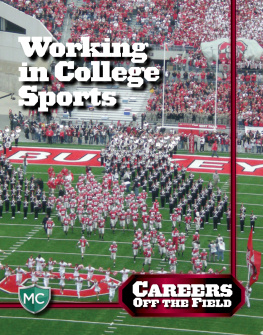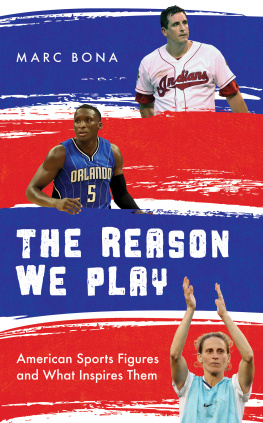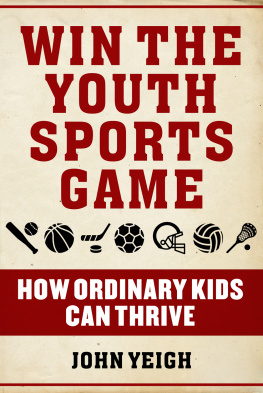An Economist Goes to the Game
AN ECONOMIST GOES TO THE GAME
HOW TO THROW AWAY $580 MILLION AND OTHER SURPRISING INSIGHTS FROM THE ECONOMICS OF SPORTS

PAUL OYER

Published with assistance from the foundation established in memory of Amasa Stone Mather of the Class of 1907, Yale College.
Copyright 2022 by Paul Oyer. All rights reserved. This book may not be reproduced, in whole or in part, including illustrations, in any form (beyond that copying permitted by Sections 107 and 108 of the U.S. Copyright Law and except by reviewers for the public press), without written permission from the publishers.
Yale University Press books may be purchased in quantity for educational, business, or promotional use. For information, please e-mail (U.K. office).
Set in Gotham and Adobe Garamond types by Integrated Publishing Solutions.
ISBN 978-0-300-21824-4 (hardcover : alk. paper)
Library of Congress Control Number: 2021949772
A catalogue record for this book is available from the British Library.
This paper meets the requirements of ANSI/NISO Z39.48-1992 (Permanence of Paper).
For my father, Calvin Oyer,
who helped develop my loves of sports and learning
Contents
Prologue
On the evening of June 13, 1997, tens of millions of people around the world were glued to their television sets. Twenty-eight seconds remained on the clock in the sixth game of the NBA Finals between the dynastic Chicago Bulls, who led the series three games to two, and the long-suffering Utah Jazz. The game was tied, and the Bulls were huddling, planning the play they would use to take the lead and the NBA championship. Michael Jordan, the Bulls star, later recalled: When Phil [Jackson, coach of the Bulls] drew up the play at the end, everybody in the gym, everybody on TV, knew it was coming to me. Jordan was the best player in the league, maybe the best in NBA history, and he had won game 1 for the Bulls with a last-second shot. According to a teammate, the plan on that play was to give the ball to Michael and get out of the way. When the game restarted, Jordan had the ball and made a move to the basket as though he were going to take a shotbut, covered by two Utah players, he dished the ball to Steve Kerr instead. Kerr, now famous as the coach of another dynasty (the Golden State Warriors of the 2010s), was then a decent NBA guard best known as an accurate shooter. After taking Jordans pass, Kerr sank a seventeen-foot jump shot to give the Bulls a lead they would not lose.
The Moroccan-born middle-distance runner Rashid Ramzi became a citizen of Bahrain and subsequently brought athletic glory to that island countrys one million people. Shortly after becoming a
A twenty-three-year-old South Korean named Jeongeun Lee6 burst onto the golf scene in June 2019, winning the U.S. Womens Open and a $1 million prize. Thats not a typo in her name; she goes by Lee6 because there are so many Lees in the Korean LPGA that it is difficult to keep track of them all. Lee6s victory marked yet another milestone in Korean domination of womens golf.
These three events may seem like a random collection of sports-page headlines and highlights. No doubt they brought joy and excitement to the Bulls, Ramzi (at least initially), Lee6, and their respective fans. But a common thread runs more subtly through these examples: we can look at all of them through the lens of economics. You could even say each is driven by economics. Economic forces drove the participants choices and strategies in all three examples. Jordan was an amazing player to watch, but his pass to Kerr showed that Jordan also had a grasp of game theory. Ramzi spent his life becoming an elite athlete but at some point realized he could get to the very top of his sport only if he gave in to the prisoners dilemma. And Lee6s million-dollar payday was the product of growing up in a country with a high savings rate and limited opportunities for women in the labor market.
ESPN doesnt explain these events as natural outcomes of economics. But having researched and taught economics since before Jeongeun Lee6 was born, I believe that all great athletes (well, most of them anyway) and fans are also sound economists. They have to understand how to make investments, how to choose strategies, and how to resolve trade-offs that separate champions from also-rans.
I could not have been Michael Jordan no matter how hard I tried. But Michael Jordan could not have become the (arguably) greatest player of all time without understanding strategy, which in turn relies on economic principles. He had to know the point at which the costs of driving to the hoop one more time outweighed the benefits. All else being equal, Jordan should have taken every shot; he was the best player on the court. But all else is not equal. In equilibrium, opponents guarded Jordan more closely than they guarded Kerr. If they had known that Jordan would take every shot, all five Jazz players would have swarmed him. To truly maximize his talents, the Bulls had to use them just the right amount. That trade-off between taking the shot himself and passing to Kerr was an economic decision that Jordan, through endless practice, coaching, and game experience, knew how to optimize.
Ramzi also had amazing natural athletic talent, which he developed through exhaustive training. It made him one of the best runners in the world. But it probably wasnt enough; he would not have won a gold medal solely through his talent and effort. He faced strong incentives to use banned substances to give himself the extra boost he needed. Although he ended up being caught and disgraced, he took a rational risk to get a huge economic payoff in both money and fame. And because all his top opponents were also taking banned substances, he had no choice if he wanted to make it to the top.
Lee6 was the product of strong economic forces, as well. She grew up in a country with an intense education system, an emphasis on skill development in childhood, and limited labor-market opportunities for talented women. So she focused her investments on developing golf skills. It was a risky bet, but it paid off.
Economics wont make you a great tennis or soccer player, but it answers some of the questions that sports fans ask every day. Should I encourage my kid to try to get a college athletic scholarship (a real one, that is, not the kind people buy)? Why do major sports figures make so much money? Why do NBA teams give players multiyear contracts that guarantee them millions of dollars per year even if they get injured or stop playing well? Why would a pitcher throw the same pitch twice in a row when mixing up pitches is the key to keeping batters off-balance?
In addition to tackling these questions internal to the game, I also hope to shed light on some aspects of public policy. Why do cities build stadiums with public funds, usually with large cost overruns, when the same cities are unable to provide basic services? Are ticket scalpers good or bad? Why cant you get a ticket to a playoff game at a reasonable price?
Along the way, well meet people whose lives are driven by both sports and economics. Bobby Estalella was a marginal catcher who hung on in Major League Baseball with the help of unnatural substances; Amy Stephens was a schoolteacher in suburban Atlanta who built a ticket empire after a random event forced her to change one evenings entertainment plans; Tina Weirather was a downhill skier who hails from the greatest per capita sports country in the world (and also the dominant country in producing false teeth). Each of these three people made choices based on the economic forces they facedthe costs and benefits of the opportunities in front of them. All of them had to adjust their plans when the competitive markets in which they were successful evolved in new and more challenging directions.
Next page










